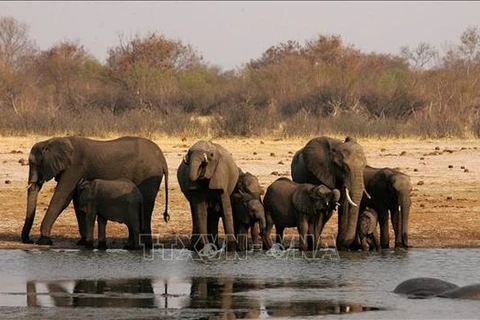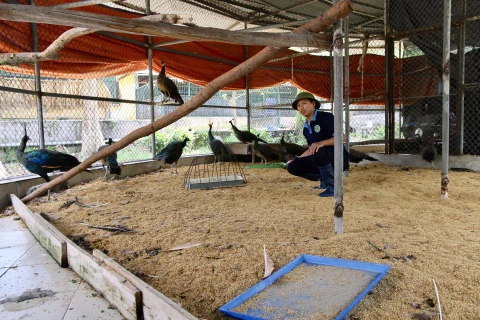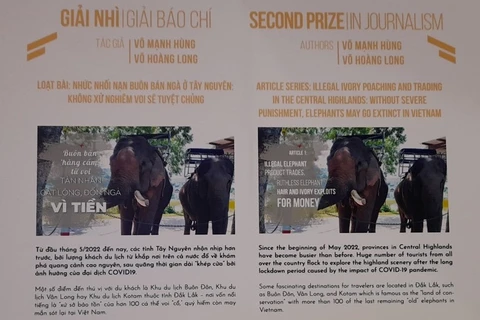Hanoi (VNA) – The World Wide Fund for Nature (WWF) on October 21 launched a communications campaign in Vietnam, Laos and Cambodia to change the habit of consuming wildlife meat among urban people, highlighting the threats to public health and the nature.
Van Ngoc Thinh, Director of WWF Vietnam, said that Vietnam, Laos and Cambodia are showing high levels of wildlife consumption, especially mammals and birds that are easily found in markets and restaurants.
He cited a survey by WWF and GlobeScan in 2021 in Vietnam, Thailand, Japan, China and the US which showed that 7% of the total people asked said that they or someone they knew had bought wildlife meat products at wildlife markets in the past 12 months.
The consumption of wild animal meat severely degrades wildlife populations, causes cross-border and domestic crimes, and significantly increases the risk of zoonotic disease transmission, he said, stressing that most consumers are not aware of the potential risks that they, their family and the society face when buying bushmeat.
Meanwhile, Dao Ngoc Van, WWF Vietnam’s senior advisor for wildlife trafficking combat, said that the main reason for people to eat wildlife meat is they believe it is fresh and delicious, helping them to show their social status, or improve their health. Through the campaign, the WWF hopes that the target group in particular and the public in general understand that wild animal meat consumption is not worth risking the health of themselves and the community, Van said.
Nguyen Van Long, Acting Director of the Department of Animal Health under the Ministry of Agriculture and Rural Development, said that there have been increasingly number of dangerous infectious diseases originating from wild animals that spread to humans such as HIV/AIDS, Ebola, MERS-Cov, COVID-19, Monkeypox.
According to the World Organisation for Animal Health (WOAH), in the last 60 years, 335 emerging diseases have occurred in humans, in which 144 pathogens (43%) originate from wild animals.
Long said that in order to improve the State management efficiency in preventing and controlling dangerous diseases transmitted from wild animals to human, along with implementing recommendations from international organisations, it is necessary to review and supplement relevant legal documents, and foster the inter-sectoral collaboration among agencies involving in wildlife management, especially media agencies in popularising international and national regulations regarding wild animals, and raising public awareness of health risks during hunting, breeding, slaughtering and consuming wild animals for themselves and the community./.
Van Ngoc Thinh, Director of WWF Vietnam, said that Vietnam, Laos and Cambodia are showing high levels of wildlife consumption, especially mammals and birds that are easily found in markets and restaurants.
He cited a survey by WWF and GlobeScan in 2021 in Vietnam, Thailand, Japan, China and the US which showed that 7% of the total people asked said that they or someone they knew had bought wildlife meat products at wildlife markets in the past 12 months.
The consumption of wild animal meat severely degrades wildlife populations, causes cross-border and domestic crimes, and significantly increases the risk of zoonotic disease transmission, he said, stressing that most consumers are not aware of the potential risks that they, their family and the society face when buying bushmeat.
Meanwhile, Dao Ngoc Van, WWF Vietnam’s senior advisor for wildlife trafficking combat, said that the main reason for people to eat wildlife meat is they believe it is fresh and delicious, helping them to show their social status, or improve their health. Through the campaign, the WWF hopes that the target group in particular and the public in general understand that wild animal meat consumption is not worth risking the health of themselves and the community, Van said.
Nguyen Van Long, Acting Director of the Department of Animal Health under the Ministry of Agriculture and Rural Development, said that there have been increasingly number of dangerous infectious diseases originating from wild animals that spread to humans such as HIV/AIDS, Ebola, MERS-Cov, COVID-19, Monkeypox.
According to the World Organisation for Animal Health (WOAH), in the last 60 years, 335 emerging diseases have occurred in humans, in which 144 pathogens (43%) originate from wild animals.
Long said that in order to improve the State management efficiency in preventing and controlling dangerous diseases transmitted from wild animals to human, along with implementing recommendations from international organisations, it is necessary to review and supplement relevant legal documents, and foster the inter-sectoral collaboration among agencies involving in wildlife management, especially media agencies in popularising international and national regulations regarding wild animals, and raising public awareness of health risks during hunting, breeding, slaughtering and consuming wild animals for themselves and the community./.
VNA
























